The SoCoBio DTP Annual Conference is a two-day event that provides the entire cohort of the South Coast Bioscience Doctoral Training Partnership (SoCoBio DTP) with opportunities to communicate their science, exchange research ideas, and share their training experience. In addition, there are networking opportunities with industry, guest lectures, discussion panels, a wellbeing workshop led by DTP Wellbeing Lead and student wellbeing champions. The conference is held at a different DTP partner each year so students also get an opportunity to visit partner institutions and tour their facilities.
We look forward to welcoming SoCoBio students, the DTP Leadership Team and our Guest Speakers to the 2024 SoCoBio DTP Annual Research Conference, hosted by the University of Kent. Please use the buttons on this page to download the Joining Instructions Pack to find all the relevant information you will need to plan your journey to the venue, view the event programme, and read the abstracts of the talks by SoCoBio students.
This year’s conference has a full programme of talks, 3-minute thesis style flash talks, posters, guest speakers (see below), and a wellbeing workshop on reflexivity. Prizes will be awarded on each day for best year 4 student talk, best year 3 Poster and best year 2 3-minute thesis.
Day two, 18 April, is industry focused. Student talks and posters will be by CASE students, and there will be talks from industry and Q&A session, giving students and industry the opportunity to network and share their research interests and network (perhaps leading to future research collaborations), learn more about the programme, and find out other ways to engage with SoCoBio DTP.
An overview of the event can be seen in the poster bellow.
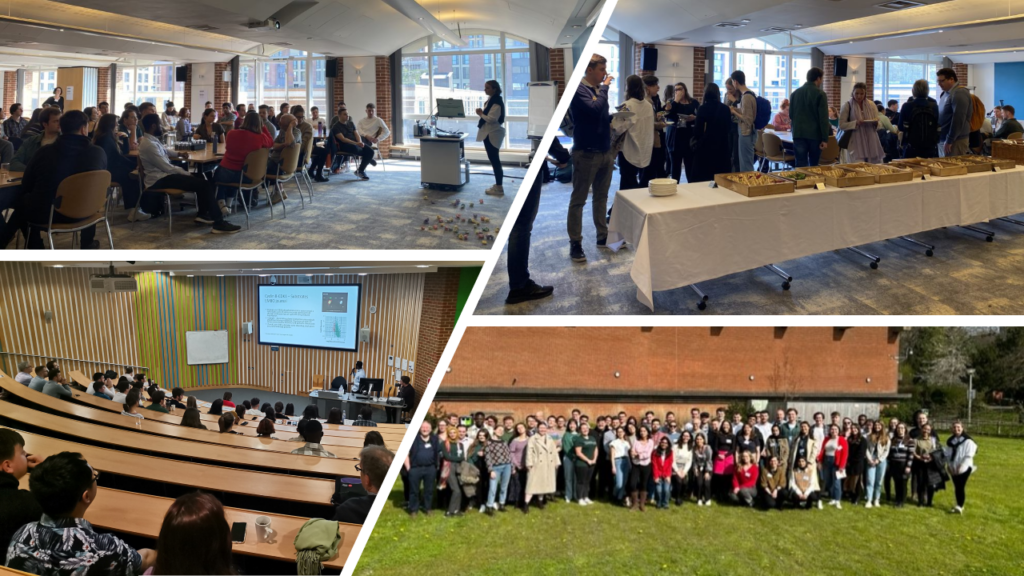
2023 Conference: Reflexivity activity, networking lunch, talks and group photo
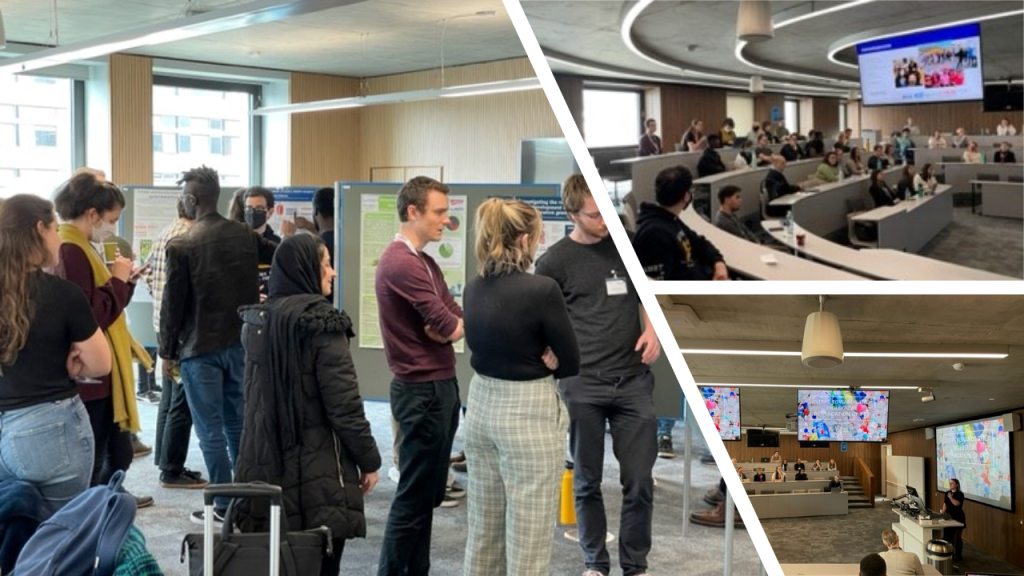
2022 Conference: Posters & talks
Guest Speakers

Dr. Barrie Rooney
Barrie is an experienced entrepreneur and leading tropical disease expert who spent many years working with Médecins Sans Frontières (MSF). While working with MSF on a range of humanitarian projects she travelled around the rainforests of central Africa diagnosing and treating African Trypanosomiasis OR Sleeping Sickness.
Winning the 2016 Innovator of the Year Award from the UK Biotechnology and Biological Sciences Research Council provided the means to set up the charity TroZonX17.
Barrie’s entrepreneurial endeavours also include setting up ExCyte Ltd, a biotech company that characterised new drug targets emerging from the human genome project.

Most recently Barrie has carried out research on making accessible rapid diagnostic tests (RDT’s) for Neglected Tropical Diseases and is an honorary lecturer in Infectious Diseases at the University of Kent. She collaborates extensively with academic researchers and organisations including the World Health Organisation (WHO) and is an ‘Entrepeneur in Residence’ for The Royal Society.
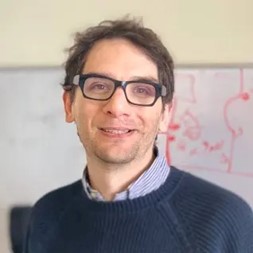
Dr Ciro Chiappini:
Talk title: ‘Nanotechnologies for Cell Manipulation’
Simple, controllable, and versatile access to the intracellular space is crucial to advancing biomedicine. Nanotechnologies are rapidly transforming our capacity to sample, sense, perturb, control and delivery to the intracellular environment. This talk will review our recent advances in developing nanomaterial-based approaches for cell and gene therapy and biosensing.
Dr Ciro Chiappini is Senior Lecturer in Nanomaterials and Biointerfaces, with a doctorate from the University of Texas, Austin. Prior to Joining King’s, he has been Marie Curie and Newton International Fellow at Imperial College London. He joined King’s College London in 2016, after completing his Marie Curie and Newton International Fellowship at Imperial College London.
His research blends nanotechnology, bioengineering and cell biology to develop functional materials that direct cell behaviour. These materials dynamically interact with the intracellular environment to detect, study, and manipulate biological processes at the molecular level.
Dr. Chiappini’s work spans tissue engineering, precision medicine, and biointerface engineering. He focuses on precisely directing cell fate in vivo, developing novel nanotechnologies for rapid molecular profiling of diseases, and modulating biochemical and physical signals in both spatial and temporal dimensions.
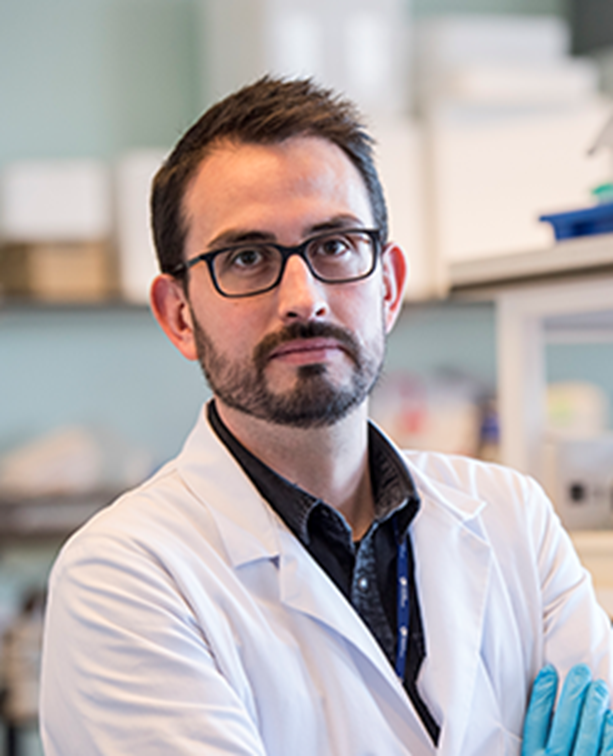
Prof Diego Gomez-Nicola
Talk title: “There and back again: a tale about research in academia and industry”
Prof. Diego Gomez-Nicola (DGN) obtained a degree in Biological Sciences (Neuroscience) by the Complutense University of Madrid and his PhD in Molecular Biology (Neurosciences) at the Autonoma University of Madrid, obtaining the doctorate in 2008. During his PhD at the Neural Plasticity Group (Cajal Institute, Madrid, Spain), he studied the role of Interleukin-15, a proinflammatory cytokine, in the control of glial reactivity and neuroinflammation. After his first postdoctoral stage at the National Hospital of Paraplegics (Toledo, Spain), studying the impact of neuroinflammation on adult neurogenesis, DGN joined, in 2010, the CNS Inflammation Group (University of Southampton, UK) as a postdoctoral fellow of the Spanish Ministry of Education and Science (MEC) and later as an EU Marie Curie fellow, under the supervision of Prof. Hugh Perry. His postdoctoral research focused to studying the regulation of cellular proliferation in prion disease, with a special focus of the innate immune response and adult neurogenesis.
In 2013, thanks to a New Investigator Grant of the MRC, he started his independent research group, supervising since then several research lines, including the regulation of microglial proliferation and activation during chronic neurodegeneration, the control of neurogenesis in neurodegenerative diseases or the design of novel viral strategies for the study of CNS function. In 2019 he joined Eli Lilly as Head of Neuroimmunology to supervise the pre-clinical and clinical portfolio in neuroinflammation. At Lilly he designed and implemented the new strategy in neuroinflammation in AD, including prioritisation of target discovery programmes, and supervised a portfolio of preclinical projects for targeting neuroinflammation in AD and pain, across the UK and US.
Now, returned to the University of Southampton as full-time Professor at the School of Biological Sciences, leads a programme of research studying preclinical therapeutic targeting of neuroinflammation in Alzheimer’s disease, as well as basic mechanisms of development of microglia in rodents and humans. Ongoing interests also include the study of the diversity of the microglial population in development and ageing, with a special interest on the mechanisms governing cell turnover. DGN is Deputy Chair of the Neuroscience and Mental Health Board of the MRC, and serves as member of multiple international committees and boards. More recently, he is the Deputy Head (Research) of the School of Biological Sciences, overseeing the research activity in Biosciences. More broadly, Diego has demonstrated a commitment to growing and shaping the ED&I agenda. From 2017-2019 he was Chair of the BioSci ED&I Committee and Staff Engagement Champion, leading the implementation of the action plan of the Athena Silver Award. He also contributed to the University Athena Swan Self-Assessment team, recently securing an Institutional Silver Award. While in Lilly, he was the site representative on a cross-site EDI working group, tackling issues such as disparity in maternity leave or flexible working policies.
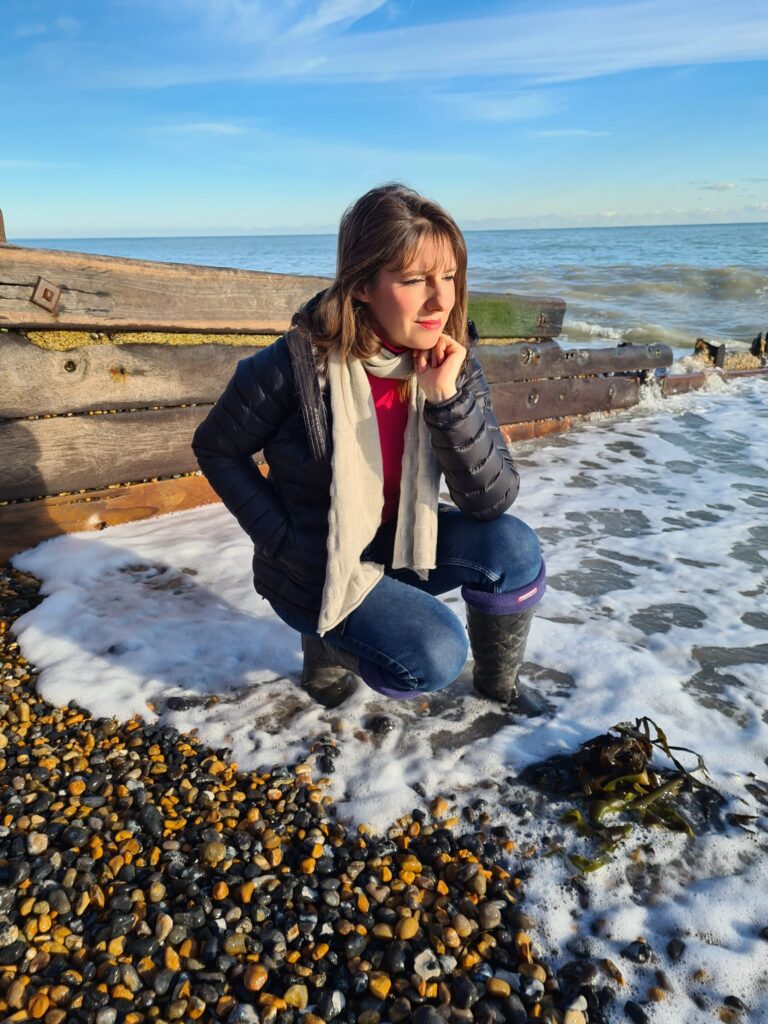
Dr Michelle Marín Chau
Talk title: ‘Dreams, Goals and Impact: Scaling and Commercialising a Seaweed Technology Company.‘
Dr Michelle Marín Chau is Communications Director and one of the founders of Nutri-San Ltd, a B2B seaweed bio-technology company. In 2023, she was granted the status of Honorary Academic in the School of Biosciences at the University of Kent.
Michelle started her career in academia, lecturing in Politics (University of York) and Development Studies (UEA), before moving into professional services. For over fifteen years she worked for global Executive Search firms in the UK and internationally.
In 2016, Michelle and her husband decided to set up Nutri-San Ltd and pursue their vision to build a sustainable seaweed technology business which, as well as producing products with environmental and health benefits for the animal feed and livestock industries, would also generate employment opportunities – particularly in marginalised coastal areas. It has operations in Vietnam, Zanzibar and the UK.
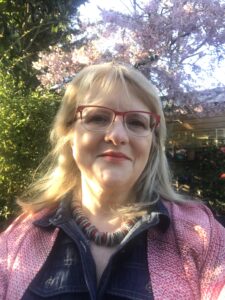
Professor Sara Rankin FRSB:
Talk title: ‘I Did It My Way: An Unconventional Path to Success in Academia‘.
Professor Sara Rankin FRSB has a first-class hons degree and PhD in Pharmacology from Kings College London. Having undertaken postdoctoral work at UCSD and CRUK she joined Imperial College London in 1995 where she is now Professor of Leukocyte and Stem Cell Biology. Her work is multisiciplinary, working with material scientist, engineers and Physicists, in the field of Regenerative Pharmacology.
Throughout her Scientific career she has been committed to societal engagement and promoting diversity and inclusion in STEM. She has won awards for Leadership, Collaboration and Innovation in Societal Engagement and has worked collaboratively with artists and creatives on projects ranging from science pop-up shops, sci-art exhibitions and is Director of the first National Black Graduates Career Conference.
Prof Rankin is dyslexic and dyspraxic and her most recent work, supported by RSB, RSC and BPS seeks to promote neuroinclusion in STEM education and careers. https://www.cacti.org.uk She works to raise awareness of Neurodiversity in STEM businesses, research Institutes and Universities and support them in setting up ND networks. The network she setup in Astra Zeneca now has just under 3000 people in their Global network.
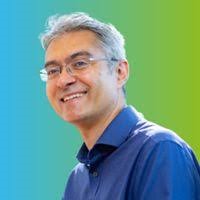
Dr Renos Savva
Talk title: ‘Spun out on Research – a Translators Journey’
Renos is an experienced entrepreneur and bio-business lecturer, with a track record of supporting and mentoring successful startups and founders. Now Head of Innovation at Discovery Park, a leading science park in Kent and recognised Life Sciences Opportunity Zone. Amongst his many roles, Renos recently joined the SoCoBio DTP’s Industry and Impact committee, where he is applying his vast expertise in the biotech industry to help direct and train our students.
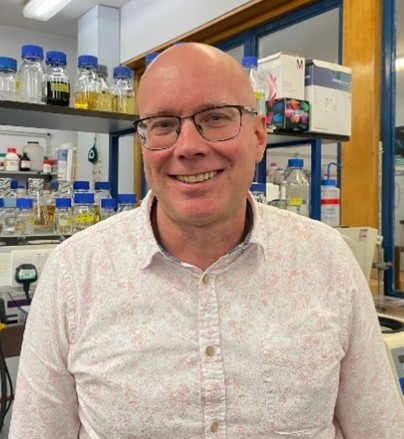
Prof Tobias Von der Haar
Talk title: ‘Business, Entrepreneurship and Innovation in the Biosciences: An introduction to the BBSRC ICURe Program’
Tobias von der Haar is Professor of Systems Biology at the University of Kent. His research group have studied how eukaryotic mRNAs are translated into protein, and how the process of protein synthesis is regulated, since 2006, combining experimental and computational approaches to address these problems.
The computational modelling work brought Tobias and his group in contact with companies interested in improving the efficiency of their protein expression systems, and his recent research interests focus on the design of efficient DNA and RNA sequences for industrial, environmental and medical applications. He currently holds a Royal Society Industry Fellowship to work on the development of more efficient RNA Therapeutics in partnership with Accord Healthcare. Tobias has held multiple roles relating to Innovation, Entrepreneurship and Career Development in these areas including serving on the BBSRC Skills and Careers Advisory Panel, as Director for Research and Innovation for the Division of Natural Sciences at Kent, and currently as PI for Kent’s BBSRC-funded Impact Acceleration Account. In his talk he will introduce the BBSRC ICURe program which trains, funds, and supports researchers and research teams to determine whether there is a market for products or services that utilise their bioscience-based ideas, research, science, and technologies.
Industrial Partners
A range of industrial partners are attending the conference and we strongly encourage students to make the most of this occasion to build connections and learn about the opportunities available to them after their PhD.
This year, we are joined by:

Founded in 1911, we’ve been at the forefront of advancing molecular bioscience for over 100 years, promoting its importance as a discipline, facilitating the sharing of knowledge and expertise, and supporting molecular bioscientists across all career stages.

Founded in 1999, BGI Genomics is the world’s leading integrated solutions provider of precision medicine, now serving customers in more than 100 countries with their specialities in genomics, transcriptomics, single cell, metabolomics, proteomics and bioinformatics.
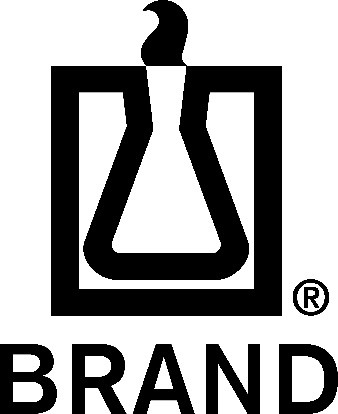
BRAND is a leading Liquid Handling Company with more than 70 years of experience and a trusted partner and reference in the lab. Researchers and lab professionals around the world work with BRAND products in the life sciences, pharma, chemistry and process analytics. Our promise is to make laboratory work simple, easy, and efficient with innovative products, perfect quality and reliable services.
We are part of the Brand Group which develops, manufactures and distributes high-quality and innovative laboratory equipment, vacuum pumps and systems with approx. 1,000 employees worldwide. Wertheim and Grossostheim in Germany serve as headquarters for the group with R&D, production, the European logistics centre, sourcing, marketing, and global sales. Further sites are in Frankfurt am Main, and, for our local entities in the United States, China, India, the United Kingdom and France, in Essex (Connecticut), Shanghai, Mumbai, London and Schiltigheim / Strasbourg.
BRAND. For lab. For life.®

Eppendorf is a leading international life science company that develops, manufactures, and distributes instruments, consumables, and services for use in laboratories around the world. The product portfolio of the business units Liquid Handling, Consumables, Separation & Instrumentation and Bioprocess includes, for example, pipettes, pipette tips, centrifuges, mixers, ultra-freezers and bioreactors for cell and gene research. In addition, Eppendorf offers a wide range of high-quality consumables.
Eppendorf products are most broadly used in academic and commercial research laboratories, e.g., in companies from the pharmaceutical and biotechnological as well as the chemical and food industries. They are also used in laboratories that perform clinical or environmental analysis, in forensic laboratories and in industrial laboratories where process analysis, production and quality assurance are performed.
Eppendorf has been active since 1945, is headquartered in Hamburg, Germany, and employs about 5,000 employees worldwide. The Group has subsidiaries in 33 countries and is represented in all other continents and important markets by distributors.

Novogene utilises scientific excellence, a commitment to customer service and unsurpassed data quality to help our clients realise their research goals in the rapidly evolving world of genomics. With almost 2,000 employees, multiple locations around the world, 69 NGS related patents, and over 16,000 publications in top tier journal such as Nature and Science, the company has rapidly become a world-leader in NGS services. In this conference, we will exhibit the latest genome sequencing solutions.
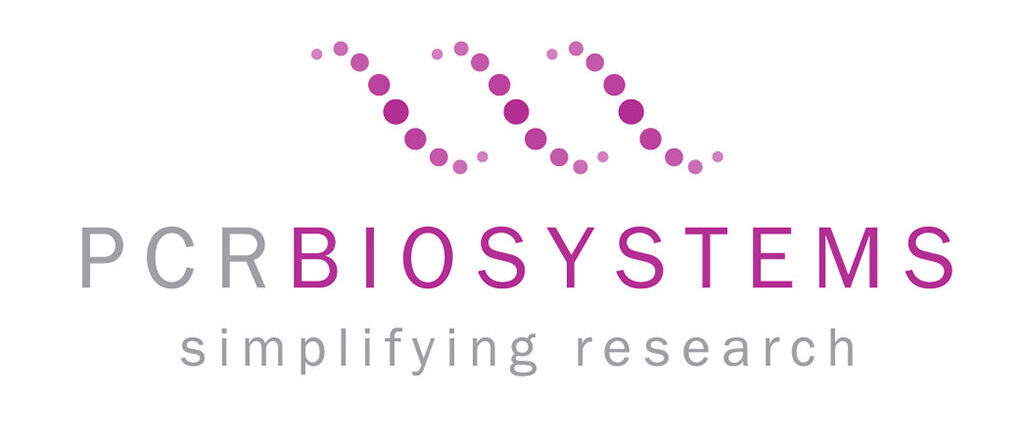
At PCR Biosystems, our aim is to develop high-performance PCR reagents to simplify your research. Our focus is on enzymes for manipulation of DNA, RNA, and nothing else, providing reagents that maximise yield and sensitivity from the simplest to most challenging of reactions. We’re a London-based company, so all the reagents are made and distributed locally ensuring lead times on orders is kept to a minimum, along with the impact on the planet. Come and chat to us about our brand-new range of qPCR and NGS mixes, and to see how we can simplify your research with sustainability in mind!
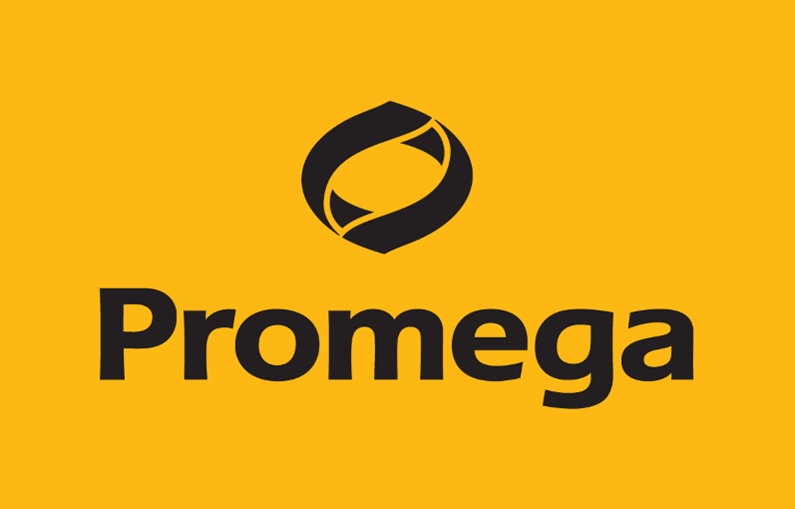
Promega Corporation is a leader in providing innovative solutions and technical support to the life sciences industry. The company’s 4,000 products enable scientists worldwide to advance their knowledge in genomics, proteomics, cellular analysis, drug discovery and human identification. Founded in 1978, the company is headquartered in Madison, WI, USA with branches in 16 countries and over 50 global distributors. For more information about Promega, visit www.promega.co.uk
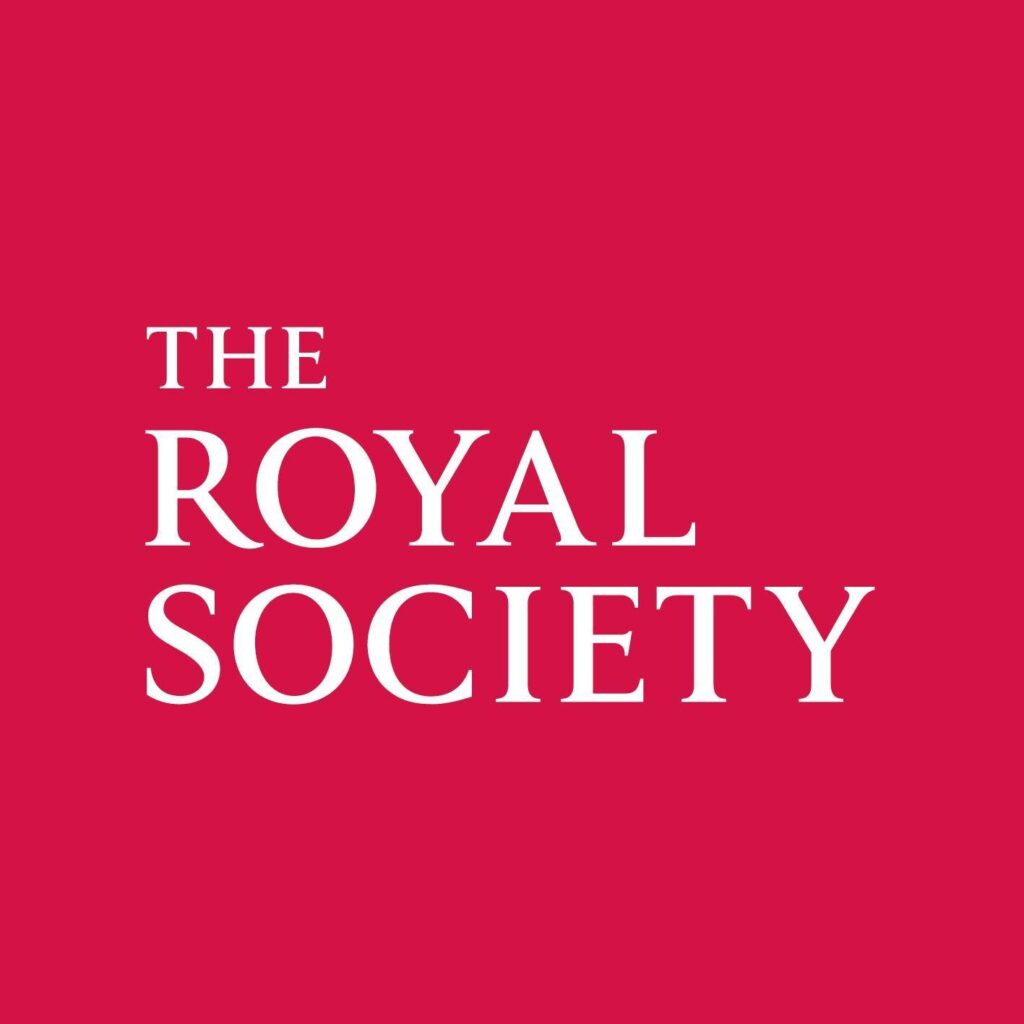
We are the independent scientific academy of the UK, dedicated to promoting excellence in science for the benefit of humanity. The Royal Society is a Fellowship of many of the world’s most eminent scientists and is the oldest scientific academy in continuous existence.
The Royal Society Entrepreneur in Residence (EiR) scheme aims to increase the knowledge and awareness in UK universities of cutting-edge industrial science, research and innovation. The scheme provides opportunities for enthusiastic, highly experienced industrial scientists and entrepreneurs to spend one day a week at a university developing a bespoke project. The scheme provides a contribution to the basic salary for the EiR and towards travel and project costs.

Singer Instruments is a lab automation company driving high impact publications across the life sciences. Our precision robots and mechatronic workstations make it possible to isolate, manipulate and analyse microbial colonies like never before. This has led to many of our creations becoming firm favourites in the labs of leading biotechs, Nobel Laureates and the top 50 universities worldwide.
Do you meddle with microbes or fraternise with fungi? Find out what our innovative products can do for your science.
Singer Instruments | UK – Germany – Singapore – California | www.singerinstruments.com
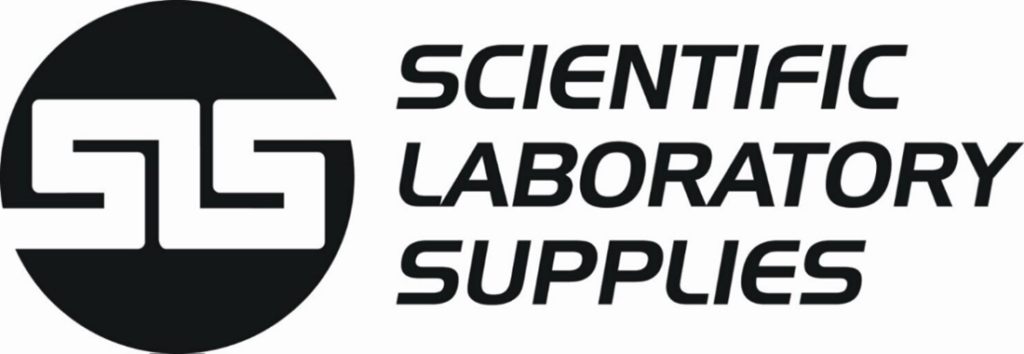
Scientific Laboratory Supplies (SLS) is the UK’s largest independent supplier of Laboratory Equipment, Chemicals and Consumables. Because of our independence, we are unique in our approach to sourcing and supplying the highest quality, best value products and brands. SLS is a business that is all about people and we pride ourselves on providing precisely what you need, exactly when you need it.
Today, SLS are partnered with some of the world’s most recognisable brands in science. We work with over 4,000 suppliers to select the best products at the best prices. These brands include Corning, Eppendorf, Merck and Thermo. With over 500,000 products and many exclusive supply partnerships with brands including Bioline, Lonza, Tecan and Integra Media Preparation, SLS truly offer a single source for scientific supplies.
Our SLS headquarters are in Nottingham, UK, with a regional footprint in Yorkshire, Scotland, Northern Ireland, Europe and Africa. SLS have advocated more sustainable laboratory practices for several years through their sustainability pledge. This pledge represents a continuous commitment to offering sustainable products that offer the highest levels of build quality and performance together with the longest lifespan and the lowest running costs. The dedicated SLS Sustainability Team continuously review the offering whilst ensuring their own practices meet the highest environmental standards.
This year's organisation committee are:
From the DTP Leadership and SoCoBio supervisors: Jenny Tullet, Becky Hall, Mark Wass, Anastasios Tsaousis, Marina Ezcurra and Mark Shepherd (University of Kent), Rohan Lewis and Vincent O’Connor (University of Southampton), Eleftheria Stavridou (NIAB), Matt Guille (University of Portsmouth).
DTP Students: Oya Canik and Matt Shaw (University of Kent) and Anastasia Kolesnikova and Jo Fish (University of Southampton).
